
“I’m telling you, we need better locks for the cans,” I suggested one morning as Kyle angrily watched me scoop up the scattered garbage. “Maybe some chicken wire around the garden too. My sister Jane says that worked for them.”
“I don’t care what your sister says. What we need is to get rid of them. Permanently.”
I remembered when we first met, how his spontaneity had seemed charming. Now, at forty, that impulsiveness had morphed into an iron-fisted need to control everything, including me.
“Kyle, please. Can’t we try the peaceful way first?”
He jabbed a finger at me. “You always do this, Josie. Always trying to make everything complicated when there’s a simple solution right in front of us.”
“Simple doesn’t always mean right.”
He slammed the broom against the side of the house. “What was that?”
I flinched. “Nothing. I’ll look into better trash cans today.”
That weekend, I found Kyle in the garage, assembling something metallic.
“What’s that?” I asked, though I already knew. Animal traps.
He didn’t look up. “Insurance. These smart traps will catch anything that comes near our trash.”
“Kyle, please. They could hurt them.”
He slammed down his screwdriver. “That’s the point! I’m so sick of you defending these disease-carrying vermin. You act like they’re some kind of pets.”
“They’re not pets, but they don’t deserve to suffer. Maybe if we just—”
“Maybe if we just what, Josie? Let them take over? Build them a guest house while we’re at it? I’ve had it with your bleeding heart routine.”
I felt tears welling up but forced them back. “Why does everything have to be solved with violence? They’re just hungry animals, Kyle.”
He stood up, his face red. “You want to know what I think? I think you care more about these pests than our home. Than me.”
“That’s not fair.”
“Isn’t it? Every time I try to solve a problem, you fight me. The raccoons, the neighbor’s dog that keeps barking all night, even that group of teens that hangs out by our fence.”
“Those are all living beings, Kyle. Not problems to be ‘solved.’”
“This is my house!” he yelled, making me jump. “I work every day to pay for it, to keep it nice, and I’m not going to let some animals destroy it while my stupid wife takes their side!”
When the raccoons started showing up again this spring, Kyle completely lost it.
That evening, I was folding laundry when he stormed in, waving a piece of paper and grinning like he’d won the lottery.
“You’ll never guess what I found at the hardware store. Industrial-grade pest control. Guaranteed to solve our little problem.”
I took the paper. It was a receipt for animal traps and some kind of poison. My hands started trembling.
“Kyle, you can’t be serious. That stuff could kill them!”
He snatched the receipt back. “That’s the point, Josie. God, sometimes I think you’re being dense on purpose.”
“But what if neighborhood cats get into it? Or someone’s dog? We could get in trouble.”
Kyle’s face darkened. “I’ve made up my mind. The raccoons are gone by the end of the week, one way or another.”
I spent that night tossing and turning, my mind racing. When did the man I married become someone who could so casually talk about killing innocent creatures?
I thought about calling Jane, but I already knew what she’d say. She’d never liked Kyle and always said there was something off about him. Maybe I should have listened.
The breaking point came on a quiet Tuesday night two days later. I was reading in bed when I heard rustling outside. Peering through the window, I saw one of the trash cans had been knocked over again.
I slipped on my robe and grabbed a flashlight. As I approached the mess, something caught my eye. It was a black garbage bag, partially open, with something moving inside.
My hands trembled as I reached for it. “Oh no. No, no, no…”
Inside were three tiny raccoon babies, barely old enough to open their eyes. They were squirming weakly.
“Kyle!” I screamed, cradling the bag close. “Kyle, get out here right now!”
He appeared on the porch, looking annoyed. “What are you yelling about? It’s the middle of the night, you crazy woman!”
“Did you do this?” I held up the bag. “Did you throw away baby animals like they were garbage?”
He shrugged. “They’re pests. I’m handling it.”
“Handling it? They’ll die!”
“That’s the point, Josie. Jesus, why are you so naive? They’re just raccoons!”
“Just raccoons? They’re babies, Kyle! Living, breathing creatures that feel pain and fear. How would you feel if someone threw you away to die?”
He laughed, a cold sound that made me shiver. “Now you’re comparing me to a raccoon? How dare you, Josie?”
“I’m comparing you to someone with empathy, and you’re coming up short.”
Kyle stepped closer, his voice a chilling growl that made my blood run cold. “You know what your problem is? You’re soft. Always have been. The world isn’t some fairy tale where we all just get along. Sometimes you have to be tough.”
“Tough? There’s nothing tough about hurting something weaker than you. That’s just cruel.”
I looked at him and wondered how I’d never seen the cruelty that had always been there.
The next morning, I called every wildlife rescue in the area until I found one that could help. A kind woman named Marla showed me how to feed the raccoon kits with a tiny bottle.
“You’re doing great,” she assured me, watching as I cradled the smallest one. “They’re lucky you found them when you did.”
As I watched the kit suckle eagerly, tears rolled down my cheeks. “I just don’t understand how someone could be so cruel.”
Marla squeezed my shoulder. “Sometimes the animals we save end up saving us too.”
That evening, I found Kyle’s journal and a detailed plan for dealing with the “raccoon infestation.” It included poison locations, trap placements, and even a schedule. The methodical cruelty of it made me sick.
When Jane arrived, she saw the journal in my hands.
“Still think I’m overreacting?” I asked, showing her the pages.
She shook her head. “Josie, this isn’t about raccoons anymore. Maybe it never was.”
“I know,” I whispered. “I think I’ve always known.”
The divorce papers were served a week later. Kyle didn’t seem surprised, just angry. As always.
“You’re really throwing me out over some pests?” he spat as he packed his things into boxes.
I stood my ground in the doorway of what was now my house alone. “No, Kyle. I’m ending this because of who you’ve become. Who you’ve always been, maybe, and I just didn’t want to see it.”
Days turned into weeks. The raccoon kits grew stronger.
The smallest one was shy and always hid behind his siblings. The middle one was curious about everything. And the biggest was protective, always watching out for the others.
Marla helped me release them back into the wild when they were ready. As we watched them toddle toward the treeline, I saw movement in the bushes. There, watching us, was their mother.
“Look,” Marla whispered. “She came back for them.”
The mother raccoon chittered softly, and her babies ran to her. Before disappearing into the forest, she turned and looked right at me. In that instance, I felt a connection to something larger than myself. Compassion.
“You know,” Marla said, “there’s an opening at the rescue center if you’re interested. We could use someone with your kindness.”
I smiled, feeling lighter than I had in years. “I’d like that.”
“You know, Josie, you can tell a lot about a person by how they treat animals. They’re like a mirror that reflects our true selves.”
Looking back, I realized the raccoons hadn’t just been victims of Kyle’s cruelty. They’d been my wake-up call. Sometimes it takes seeing someone else’s vulnerability to recognize your own.
As the raccoons disappeared into the trees, I took a deep breath and felt ready for a fresh start. I knew I deserved better, and that someday, I’d find the right person who saw the world with the same compassion I did.
I Rented a Room from a Sweet Old Lady — but One Look at the Fridge the Next Morning Made Me Pack My Bags

When Rachel found a cozy room rented by a sweet old lady, it seemed like a perfect escape from her struggles. But beneath the floral wallpaper and warm smiles, something far darker was lurking… something that made her pack her bags the very next morning.
When you’re desperate, you cling to anything that feels like hope. That’s where I was — my little brother’s medical bills towering over me, full-time classes pushing me to my limits, and late-night waitressing draining what little energy I had left.
When I got into a university in a new city, I should’ve been ecstatic, but the reality of finding affordable housing made it hard to celebrate. So when I stumbled across a listing for a cozy room in a sweet old lady’s house, it felt like a lifeline.

A hopeful woman holding a cellphone | Source: Midjourney
The rent was ridiculously low, and the photos showed a charming little place with floral wallpaper and vintage furniture. The ad said: “Perfect for a quiet, respectful female tenant. No pets, no smoking.”
It was ideal.
When I arrived there, my landlord Mrs. Wilkins greeted me at the door with a warm smile and a smell of fresh lavender lingering in the air. Her hair was neatly pinned back, and she looked like someone who should’ve been knitting by a fireplace, not renting rooms to struggling students.
“Oh, you must be Rachel,” she said, ushering me inside. “You’re even lovelier than I imagined. Come in, dear, come in!”

An older lady smiling | Source: Midjourney
Her eyes seemed to linger a bit too long, scanning me from head to toe. “Tell me about your family, dear,” she said, her voice honey-sweet. “Any siblings?”
“My little brother Tommy,” I replied. “He’s staying with our widowed aunt while I’m here. She helps take care of him while I’m studying.”
Mrs. Wilkins’s smile tightened almost imperceptibly. “How… convenient,” she murmured. “And your parents?”
“They passed away last year in an accident.”
“Oh, how sad. Come in… come in,” she said as I followed her inside.

An anxious woman at the doorway | Source: Midjourney
The house was straight out of a storybook. Knick-knacks lined the shelves, and a geometric-patterned couch sat invitingly in the living room adorned with floral wallpaper. The faint aroma of vegetable soup drifted from the kitchen.
“I made us some dinner,” she said, leading me to the table. “It’s been ages since I had company.”
“That’s very kind of you,” I started, but she interrupted.
“Kind?” She chuckled, a sound that didn’t quite reach her eyes. “Kindness is… complicated, Rachel. Some might say I’m too kind.”
I smiled, trying to ignore the sudden chill. “Thank you, Mrs. Wilkins. This place is amazing.”
“Amazing,” she repeated, almost to herself. “Yes, that’s one way to put it.”
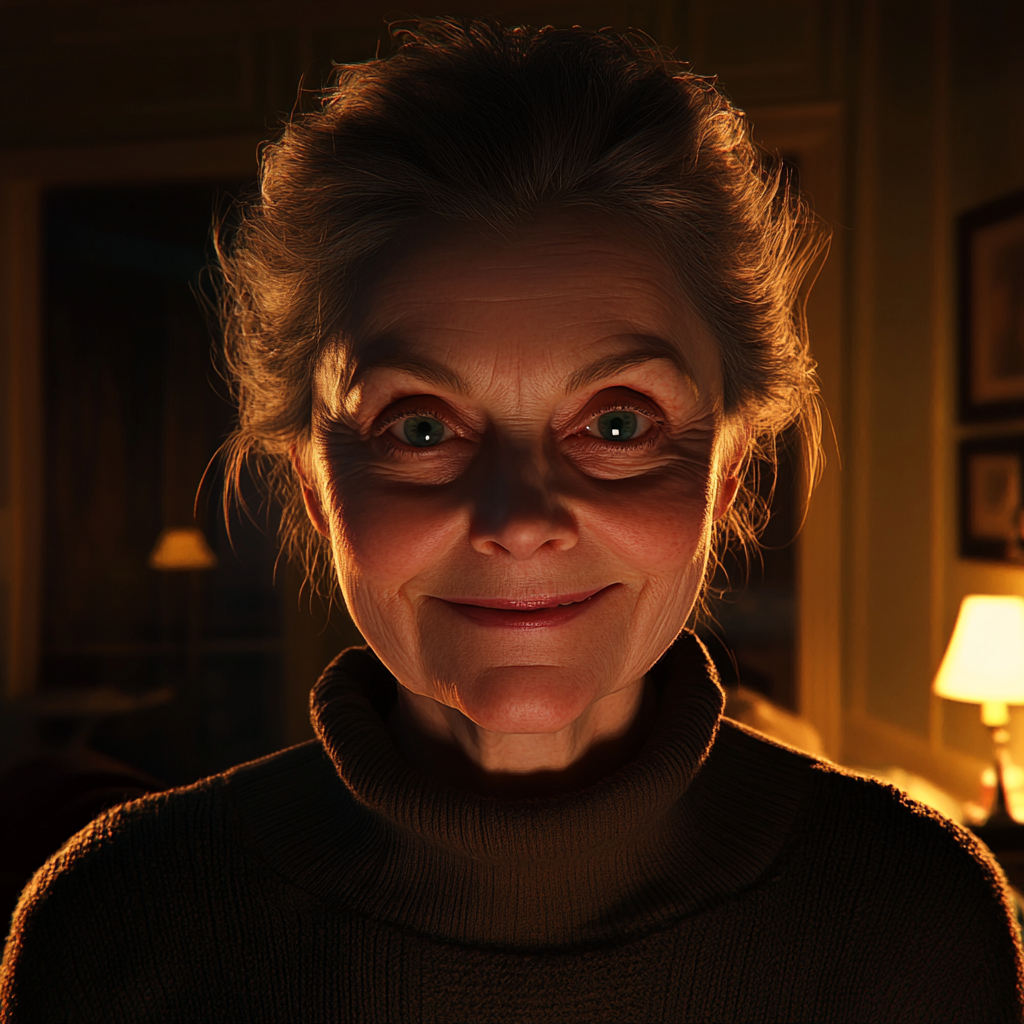
An older woman with a haunting smile | Source: Midjourney
Over bowls of hearty soup, I shared bits of my life. She nodded sympathetically, her hand occasionally patting mine with a grip that was just a fraction too tight.
“You’ve been through so much,” she said softly. “But you’ll be just fine here, dear. I can feel it.”
There was something in her tone… a promise that felt more like a warning.
“I hope so,” I replied, my earlier comfort now tinged with an unexplained unease.
For the first time in months, I felt something between safety and something else. Something I couldn’t quite name. That night, I slept deeply, yet somewhere in the back of my mind, a small voice whispered: not everything is as it seems.

A woman lying in the bed | Source: Midjourney
The next morning, I woke up early, feeling optimistic.
The sun streamed through the lace curtains as I grabbed my toiletries and headed toward the kitchen, craving coffee before a hot shower.
That’s when I saw it. A huge list, almost four feet long, was taped to the fridge, written in bold, bright red letters: ‘HOUSE RULES – READ CAREFULLY.’
I froze.

A horrified woman | Source: Midjourney
I squinted, leaning closer as I began reading the rules one by one:
1. No keys will be provided. Mrs. Wilkins will let you in between 9 a.m & 8 p.m only.
2. The bathroom is locked at all times. You must ask Mrs. Wilkins for the key & return it immediately after use.
3. Your bedroom door must remain open at all times. Privacy breeds secrets.
4. No meat in the fridge. Mrs. Wilkins is a vegetarian & does not tolerate carnivores.
5. You must leave the house every Sunday from 10 a.m. to 4 p.m. Mrs. Wilkins has her “ladies’ tea.”
6. No visitors. Ever. Not even family.
7. Mrs. Wilkins reserves the right to enter your room whenever she pleases.
8. Cell phone usage is restricted to 30 minutes daily, monitored by Mrs. Wilkins.
9. No music allowed. Mrs. Wilkins loves a peaceful & quiet environment.
10. You are not allowed to cook your own food without Mrs. Wilkins’s consent.
11. You are allowed to use the shower only three times a week.
12. ******* RESERVED FOR LATER*******

A huge list of rules taped to a refrigerator | Source: Midjourney
“Reserved for later?” My stomach twisted with every rule I read. By the time I reached the end, my hands were trembling. What had I gotten myself into?
“Good morning, dear,” Mrs. Wilkins’ voice sang from behind, startling me.
I jumped, spinning around. She stood there with a serene smile, her hands clasped in front of her sweater. “Did you read the rules?” she asked, her tone suddenly sharp. “Every. Single. Word?”
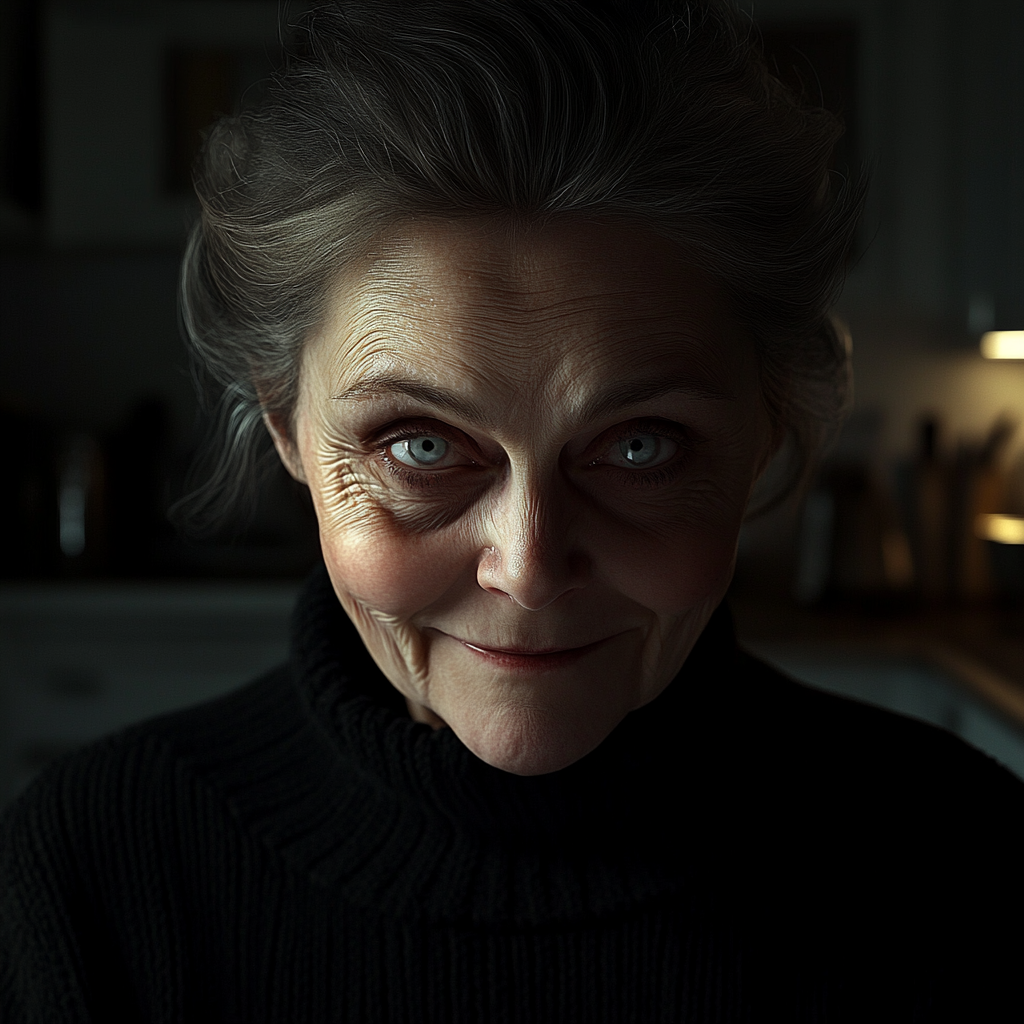
An older woman smiling gravely | Source: Midjourney
“I… yes,” I stuttered.
Her smile didn’t reach her eyes. “And?”
“They seem… thorough,” I managed.
Mrs. Wilkins stepped closer. “Thorough is an understatement. These rules keep order. Keep safety. And discipline.”
“Safety?” I repeated.
“From chaos, dear,” she said. “Chaos is everywhere. But not in my house. NEVER in my house.”

A startled young woman | Source: Midjourney
“Did you have bad experiences before?” I asked, trying to sound casual.
Her laugh was a brittle thing. “Bad experiences? Oh, you have no idea.”
“Did you say my brother Tommy can’t visit?” I pressed, remembering my promise to check on housing options for him.
“No visitors,” she repeated, each word precise. “Especially not children. They are… unpredictable.”
“But—”
“No exceptions,” Mrs. Wilkins interrupted, her smile freezing.

An older woman smiling wickedly in the kitchen | Source: Midjourney
I nodded, my mouth suddenly dry.
“I hope the rules aren’t too much for you, dear,” she said, her voice returning to that earlier sweetness. “They’re very important to me.”
“Of course,” I stammered, trying to keep my voice steady. “I understand.”
But I didn’t understand. I didn’t understand how someone so kind could expect anyone to live under those rules. No key? No privacy? A bathroom lock?
Her eyes never left me as I mumbled something about needing to get ready for the day and retreated to my room, feeling like I was being watched.

A startled woman holding her head | Source: Midjourney
Behind me, Mrs. Wilkins hummed a tune that sounded almost like a children’s nursery rhyme.
I heard her footsteps pause outside my door. Then, surprisingly, they receded. The front door opened and closed. Through my window, I saw her walking to what looked like a small greenhouse in the backyard.
This was my chance.
I leaned against the door, my breath coming in shallow bursts. I had to get out. I couldn’t live like this… not when I was already stretched so thin.
As quietly as I could, I began stuffing my clothes into my suitcase. Every creak of the floorboards made my heart race. I kept glancing at the door, half expecting Mrs. Wilkins to appear with that unsettling smile.

A suitcase stashed with clothes on a bed | Source: Midjourney
“You’re making quite a bit of noise,” a voice suddenly crackled through an old intercom I hadn’t noticed before. “Would you like to explain what you’re doing?”
I froze. My hand hovered over a sweater, my heart pounding.
Mrs. Wilkins’s voice continued, razor-sharp. “Did you forget rule number seven? Everything requires my approval.”
Beads of sweat formed on my temples as I finished stuffing my clothes into my suitcase. I zipped up my bag, grabbed my things, and tiptoed toward the front door. But as I reached for the knob, a voice stopped me cold.
“Leaving already, dear?”

A shocked woman turning around | Source: Midjourney
I turned slowly. Mrs. Wilkins was standing at the end of the hallway, her expression calm but her eyes sharp.
“I, uh… I forgot I had something urgent to take care of,” I stammered.
“Oh, I see. Well, if you must leave, you must leave. But remember something: Everything is always worth discussing.”
Her tone was polite, but there was something chilling about it. The way she emphasized “must” felt like a challenge… a dare.
I nodded quickly, opened the door, and stepped out into the crisp morning air.
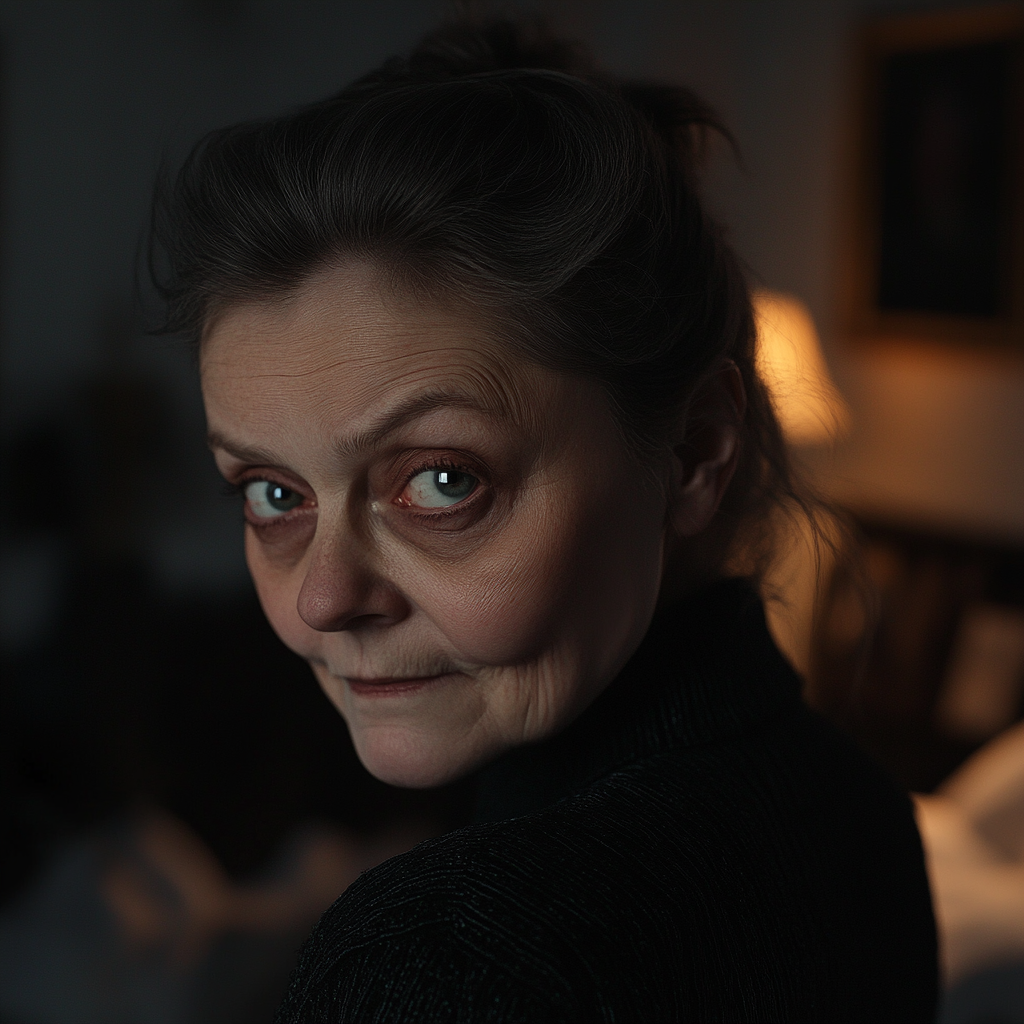
An older woman with a malicious glint in her eyes | Source: Midjourney
I didn’t stop walking until I reached a park a few blocks away. My suitcase sat beside me on the bench as I tried to catch my breath. What now? I had nowhere to go, no backup plan. The thought of giving up and going home crossed my mind, but I couldn’t. My brother needed me to make this work.
“Hey, you okay?” a voice cut through my thoughts.
I looked up to see a guy about my age. He was holding a cup of coffee and a paper bag, his dark hair falling into kind brown eyes.
“Not really,” I admitted.

A worried young man | Source: Midjourney
He studied me for a moment, something calculating behind those eyes. “You look like you’ve just escaped something. Not just a bad morning, but… something else.”
I tensed. “What makes you say that?”
He chuckled. “I’ve got a sixth sense for people running from something. Call it a talent. I’m Ethan, by the way.”
“Rachel,” I said.

A sad woman sitting on a wooden bench | Source: Midjourney
He sat down beside me and offered me the bag. “Croissant? Looks like you could use it.”
“Are you always this forward with strangers?” I hesitated before taking the croissant. “Thanks.”
“Only the ones who look like they’ve got a story. What’s yours?”
As I ate, I told him everything. About Mrs. Wilkins, her bizarre rules, and how I had no idea what to do next. He listened, nodding occasionally, his eyes never leaving my face.
“Sounds rough,” he said when I finished. “But something tells me there’s more to this story.”
“What do you mean?”

A shocked woman sitting on a bench | Source: Midjourney
He leaned in closer. “People like that old lady? They don’t just have rules. They have reasons. Dark reasons.”
We talked for hours. Ethan said that he worked part-time at a café near the campus. By the time the sun set, I had a lead on a room in a shared apartment — affordable, close to the campus, and most importantly, with normal rules.
“I’ll help you move if you want,” he offered, his tone almost too eager.
“Really?”
“Of course,” he said, flashing a grin that didn’t quite reach his eyes. “Can’t leave you hanging.”

A man sitting on a wooden bench and smiling | Source: Midjourney
Over the next few weeks, I settled into my new place, found a better-paying job at Ethan’s café, and started to feel like I could handle life again. Ethan and I grew close, and before long, he became more than just a friend.
But sometimes, late at night, I’d catch him looking at me strangely. Almost… appraisingly.
“Do you ever wonder about Mrs. Wilkins?” he’d ask randomly.
“Not really,” I’d reply. But that was a lie.
Sometimes, I think about Mrs. Wilkins and her strange little house. I wonder if she ever found another tenant. A chill would run down my spine when I remembered her last words: “Everything is always worth discussing.”
But one thing’s for sure: leaving that morning was the best decision I ever made.

A woman with a warm smile etched on her face | Source: Midjourney
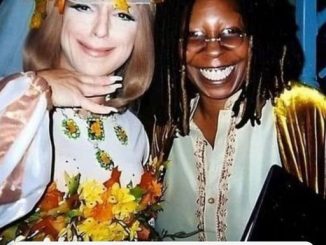

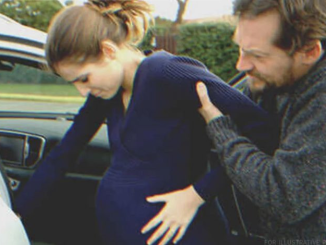
Leave a Reply